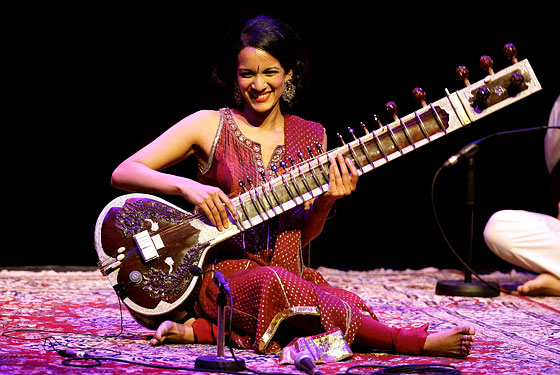
Anoushka Shankar may be the less famous of sitar icon Ravi Shankar’s musical daughters — her half-sister is Norah Jones. But she remains a star in her own right, bringing a fresh approach to her father’s many-stringed instrument. Tomorrow night at Carnegie Hall, she plays the world premiere of the first piece for sitar and orchestra that her father wrote specifically for her, accompanied by the famously conductorless Orpheus Chamber Orchestra. She spoke to us about being an apprentice to her father and hanging with George Harrison.
What was it about the instrument that appealed to you?
The piano actually, in a sense, was my first love, because it was something I came to on my own, and it’s very accessible as a child, whereas with a sitar, in the beginning it’s uncomfortable, it hurts to play. The sitar drew me in, though. To some degree it was a way for me to be close to my father, it was a bond we shared. My parents got married when I was 7, I didn’t really grow up with him before that.
Do child-size sitars exist?
They do! Mine were made for me — I had three on the way to a full-sized sitar.
Are there specific challenges of pairing a sitar with orchestra, as you’ll be doing in this concert?
The sitar is representing the Indian tradition, more based on melody and rhythm than harmony and counterpoint, so to bridge that gap, one tradition has to travel to the other.
Was it ever hard to have your father as a teacher?
It was challenging because of the nature of this type of teaching. You take a guru in Indian classical music, it’s akin to having a spiritual guru. There’s that kind of respect that’s given to teachers. A lot of my father’s other disciples have a slightly more formal relationship than I do with him.
In what way?
For example, they might stand up when he walks in the room, or touch his feet if they haven’t seen him in a long time, things like that. For both of us, as I grew up, it was something for us to navigate. He wanted to be a close and fun father, but he was used to having complete dedication from his other students, because they would reach a certain level, practicing eighteen hours a day, to come and learn from him. Obviously with me it was very different.
Your website opens by calling you “daughter of legendary sitar virtuoso Ravi Shankar.” Was there ever a time when you had to think about how associated with your dad you wanted to be?
At the beginning, it wasn’t a thought, because I began as an apprentice. Because our music is an oral tradition and also very improvised and linear, it’s quite normal for a student to begin their career by accompanying their guru and then eventually going out on their own.
You were close with George Harrison, right?
He was, in a way, my father’s best friend, so I just grew up with him being a big part of my life. He was quite key for me, in the sense that so many people I’d meet, whether family or friends, would always respond with this kind of blind enthusiasm to the fact that I played music, like, “Wow, you’re so lucky, you owe this to your father,” and so on, and he’s the one person who, when he saw me, would sit me in a corner and say, “Hey, so are you still enjoying it? Do you love it? Do you feel freaked out at all?”




